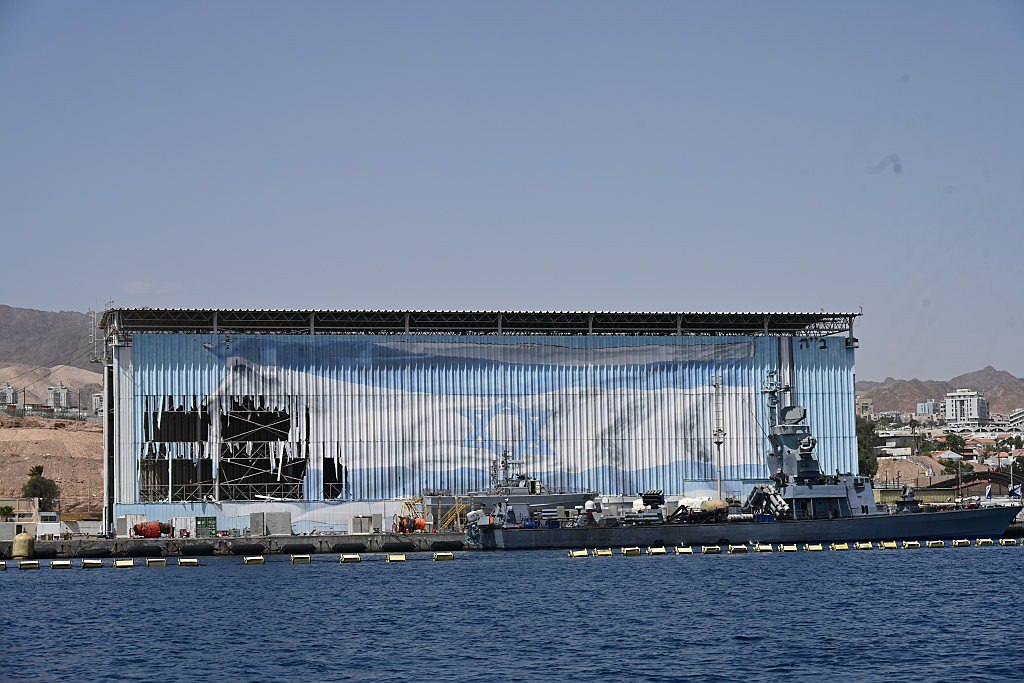Houthi attacks in Bab el-Mandeb strait have completely halted the trade activities of the Port of Eilat, placing it in a complicated financial situation.
Aftermath of kamikaze UAV strike by the Islamic Resistance in Iraq on Israeli naval base in Eilat, credit: @clashreport
Eilat Port, Israel’s southern sea gate, is used for trade with the Far East and Australia. However, ever since the Houthis’ missile threats to transiting vessels virtually blocked their pathway through Bab el-Mandeb strait, Eilat’s port has found itself cut off. The result has been a halt to all import and export activities.
Soon after the beginning of the Israel-Hamas war, which started on Oct. 7, the Iranian-backed Yemen-based Houthi group leveraged its strategic location to disrupt global maritime traffic by attacking vessels sailing through Bab el-Mandeb. The Houthi attacks have resulted in the loss of life among sailors and damage to at least 15 international vessels, with one ship being wholly lost to the sea.
Gideon Golber, the CEO of Eilat Port, told The Media Line that ship traffic at the port has completely stopped since the Houthi attacks began. “Every month, we had between 12 and 13 ships coming and going, and now we have 0,” he said.
Every month, we had between 12 and 13 ships coming and going, ……..
Golber emphasized that the port’s primary import was cars, noting that 50% to 60% of cars imported into Eilat came from the Far East. However, since new cars are no longer arriving, the number of cars in the port’s storage has been rapidly reduced. “In November, we had 50,000 cars stored in the port; now we have only 10,000. The car importers are taking the cars every day but no cars are coming through Eilat anymore,” he added.
Regarding Israel’s exports abroad, Golber explained that Israel exported monthly through Eilat Port 1.8 million to 2 million tons of potash from the Dead Sea to the Far East, usually directed to India and China. He added that if these products were now being exported at all, it was through the Mediterranean Sea, via the Cape of Good Hope in South Africa—a significantly longer shipping route.
In addition to potash, Golber said Israel also exported 100,000 to 150,000 heads of cattle, mostly cows and sheep, through Eilat Port.
He said that at the beginning of the war, it was thought that Bab el-Mandeb would be reopened in one to two months. “But what we see is that nobody does anything but protect ships from missile attacks. So, maybe it will take more time than we thought,” he said.
Nobody does anything but protect ships from missile attacks. So, maybe it will take more time than we thought.
In any case, Golber stressed, the port’s management did not take any measures regarding the salaries of its 170 employees, and, therefore, the port is currently facing a considerable burden of expenses.
“We are still paying salaries, we are paying taxes, we are paying for electricity, we are paying a lot of things,” he said, noting that the port’s expenses stand at 6 million to 10 million shekels ($1.6 million to $2.7 million) a month while income is close to zero.
“We sent some letters to the government and the Transportation Ministry to see what we could do. Still, we haven’t gotten any answer,” he said. “We are now bringing money from our pockets,” he continued, noting that great efforts were being made to keep the port open.
However, Golber said, if the port does not receive assistance in the upcoming months, it will have to take action regarding the salaries it has been paying for the last five months without any income to cover them.
Somebody needs to do something against the Houthis to stop this aggression
He added that the port is also central to Eilat’s economy. While the city historically relied financially on tourism, Golber noted, crises such as the COVID-19 pandemic showed that Eilat needed other avenues of revenue, leaving the port as a central source of income for Eilat.


